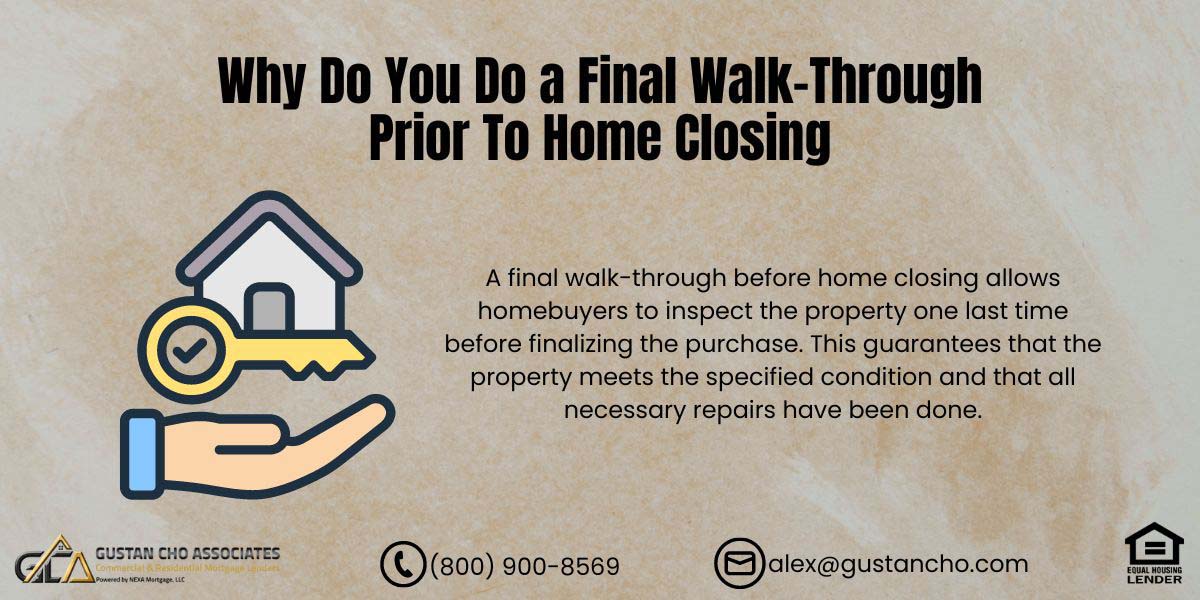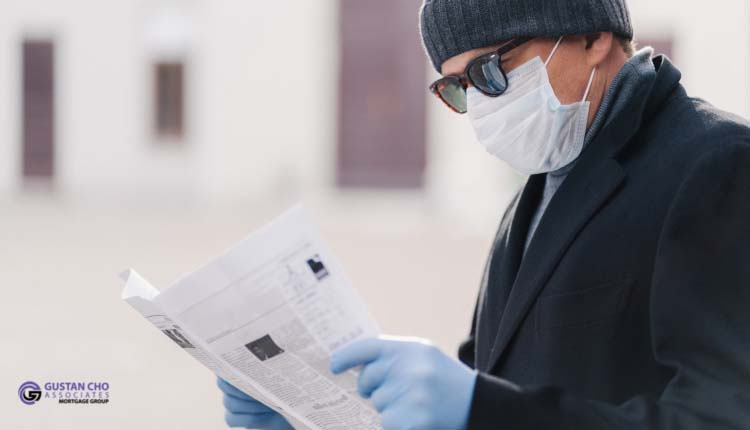In this article, we will cover and discuss the final walk-through prior to home closing. A Final Walk-Through Prior To Home Closing To Inspect Home option is given to all home buyers. It is not mandatory for a home buyer to do a final walk-through prior to home closing. However, it is highly recommended that all home buyers do a final walk-through prior to home closing. Once a home is closed, that is it!!! In the following paragraphs, we will cover why do you do a final walk-through prior to home closing.
When Is The Final Walk-Through Prior To Home Closing?
Home Buyers cannot change their minds once they close on home. Cannot re-negotiate purchase terms. Everything that needs to be negotiated needs to be done prior to closing. Chances are that the last time buyers inspected the home was when they first entered into the purchase real estate contract.
Many things could have happened to the home since the last visit. Especially if the property was vacant. Or if the sellers moved out of the property prior to closing.
Why Do You Do a Final Walk-Through Prior To Home Closing?
A home inspection final walk-through is not a negotiations matter nor is it a contingency. Most final walk-through prior to home closing is normally done the same day or the day prior to closing.
For the majority of home inspection final walk-throughs prior to home closing, there are no issues. 95% of the time is just a formality to make sure there are no damages sustained on the subject property.
Ready for Your Final Walk-Through? Let’s Make Sure Everything Is Perfect Before Closing!
Contact us today to schedule your walk-through and ensure everything is in order before you finalize the deal.What Happens at The Final Walk-Through Prior To Home Closing?
It is to reassure buyers the property is in the same condition that it was when the home buyer first saw it when they entered into a real estate purchase sales contract.
If there were items on the purchase contract that the home sellers needed to make, it is during the final walk-through prior to closing home inspection. This is the stage where the home buyers will check whether or not the items were repaired. A final-walk through prior to home closing is very highly recommended.
Things To Check On Final Walk-Through Prior To Home Closing
Some home buyers hire a home inspector again to redo the home inspection during the final walk-through stage in the event the home has no damages. There are items buyers should check for on a final walk-through prior to the home closing inspection. In the event, that there are items that were damaged since the home purchase contract make sure that it has been completed. If not done, then the chances of getting it repaired prior to closing are not likely.
Do Sellers and Builders Clean The House Before Closing?
The money for repairs needs to be held by the title company in an escrow account until the repairs have been done. Or cash back for repairs needs to be agreed upon prior to closing. The items listed below should be thoroughly checked during the final walk-through prior to a home closing.
What Do Homebuyers Look For at Final Walk-Through Prior To Home Closing?
Make sure that all light fixtures are in working order by checking every light fixture. Check all plumbing fixtures by turning on the water and letting it run and look under sinks for any leakage. Check and test all household appliances to see if they all work and are functioning. Make sure the garage door works.
How Long Does it Take to Close on a House?
The time it takes to close on a house typically ranges from 30 to 45 days, although this can vary based on several factors. The loan approval process, which can span from a few weeks to over a month, is one of the lengthiest steps. Additionally, scheduling and completing a home appraisal and inspection, conducting a title search, and obtaining title insurance can each add several days to the timeline.
Negotiations for repairs or price adjustments following the inspection and the time needed for any repairs can further extend the closing period. The borrower must also receive the Closing Disclosure three business days before closing, ensuring they have time to review the mortgage terms and costs.
Another critical step is the final walk-through before home closing, which ensures that the property is in the agreed-upon condition and can be scheduled a day or two before closing. This walk-through can identify any last-minute issues that need addressing, potentially impacting the closing timeline. Document preparation, including the sales contract and loan paperwork, is also necessary and can take additional time.
While cash purchases usually close faster by bypassing the mortgage process, issues like credit problems or title disputes can cause delays. Maintaining efficient communication with your real estate agent, lender, and other involved parties is crucial to ensure that any possible delays are promptly addressed and stay on track.
What Slows Down or Delays a House Closing
Check if every garage door openers are functional. Check all doors and make sure the doors are aligned and in working order. Make sure that all toilets are in working order. Flush them and make sure that the water stops once the tank is full.
Do a visual inspection of the walls, floors, and ceilings of the home. Make sure there are no drywall cracks. Check to see that the kitchen garbage disposal, trash compactor, and exhaust fans are in proper working order.
Final Walk-Through Before Closing? Let Us Help You Ensure Everything Is in Place!
Reach out now to set up your walk-through and address any last-minute concerns before closing.What Do Lenders Do Right Before Closing?

Debris removal can get quite costly. Not all garbage left by the driveway will be picked up by the regular garbage man. Make sure the basement does not show any signs of flooding. If you have any questions about the final walk-through prior to home closing or any other topics, please contact us at Gustan Cho Associates at (800) 900-8569 or text us for a faster response. Or email us at gcho@gustancho.com. The team at Gustan Cho Associates is available 7 days a week, evenings, weekends, and holidays.
Buying a Home That Needs Repairs
After the home inspection, you may have negotiated for repairs to be completed. You are relying on the seller to complete these repairs in good faith before the closing date. While most of the time, these are completed, there are still occurrences where this is a major issue. Just before the closing date, you and your realtor will complete a final walk-through of the property. At this time, you will ensure the property is in the same condition as when you agreed to purchase it.
Since the home will more than likely be empty now, you will see things that you may not have at the time of inspection. Such as scratches on the floor where furniture was before.
Usually, this is not a deal-breaker, and most sellers have the house cleaned up before the final walk-through. You will want to make sure all agreed-upon repairs have been completed. One way to avoid agreed-upon repairs being completed is to take matters into your own hands. For example, if a water heater needs to be replaced, you may ask for a seller credit and complete the repair on your own time after the closing date. Otherwise, you rely on the seller to fix the water heater to your standards.
Home Issues During Final Walk-Through and Solutions
Now, let’s dive into some horror stories. Recently, a client of ours in the Chicagoland area went to complete the final walk-through only to find out about home issues during final walk-through. The basement is currently flooded with standing water. That’s right, standing water.
The client clearly was not ready to buy that home in the condition due to home issues during final walk-through. The sellers had already moved out and had no way to know the house was flooded.
At this point, our client had to get with his real estate attorney and postpone the closing until the basement was repaired. This flooding caused a wrinkle in both the buyer’s and the seller’s lives. The closing was pushed back about ten business days so the repairs could be completed. This can be costly to the seller as there are fees, such as the rate lock extension, that must be paid.
Home Issues During Final Walk-Through With Landscaping and Maintenance
Landscaping issues and maintenance are other common issues. Many times, as the sellers are preparing for their move day, they neglect yard work. Why are there people who love yard work? We feel more people do not enjoy it. Sellers may have canceled their gardener or lawnmowing service. As a buyer, you may have a clause in the purchase contract stipulating the seller must continue to mow their grass up until the closing. We have seen credits, usually around $100, negotiated into the contract for any cleanup that may be necessary for the yard. Let’s be honest: after the mortgage lending process and moving your belongings, you likely do not want to mow the grass.
Examples of Home Issues During Final Walk-Through
We will end the horror stories with the strangest story we have heard. During a final walk-through, a family found a 15-foot boa constrictor in the crawl space of a home in Philadelphia. Of course, this was a scary moment. Animal Control was called instantly. The situation was taken care of. It did leave the buyers with a few questions, however. Are there more snakes? How did it get there? And so on.
Why Should You Close at the end of the Month?
Closing on a house at the end of the month can offer several financial advantages for homebuyers:
- Lower Upfront Interest Costs:
- When you seal the deal on your new home, you’ll only need to pay interest from the closing date until the end of the month. If you close the deal towards the end of the month, the prepaid interest you owe will be lower since the period is shorter. This means more savings for you and less upfront costs to worry about! Happy house hunting!
- Synchronizing Payments:
- Closing at the end of the month aligns your first full mortgage payment with the beginning of the month. This can simplify budgeting and cash flow management, as your mortgage payment will be due on the first of the month following a full month after closing.
- Cost Savings:
- By minimizing the prepaid interest period, you can save substantial money at closing. This can be especially advantageous for purchasers who require a way to minimize their initial upfront expenses.
- Streamlined Closing Process:
- Lenders and title companies are often prepared for end-of-month closings, making the process more efficient. Many real estate professionals expect and plan for a higher volume of closings at the end of the month.
- Final Walk-Through Before Home Closing:
- Scheduling the final walk-through before the home closes near the end of the month ensures that the property is in the agreed-upon condition right before you take ownership. This timing can help identify any last-minute issues that must be addressed, ensuring a smoother transition.
Wrapping up the transaction at the end of the month might help reduce some initial costs. On the flip side, it could also make the process more fast-paced due to the high volume of transactions. So, it’s vital to ensure all your paperwork and finances are in order to avoid any delays and ensure everything goes smoothly during the final inspection before closing on your new home. Stay positive and proactive, and you’ll be all set!
Time for the Final Walk-Through? Let’s Make Sure Your New Home Is Perfect!
Contact us today to arrange your walk-through and ensure everything is as expected before you sign the papers.How To Resolve Home Issues During Final Walk-Through and Who To Contact
What to do if you have a major issue during final walk-through? Many of these issues can be resolved by utilizing a real estate agent and real estate attorneys for the buying process. Handling issues like this may be impossible to do on your own. It is important to work with highly skilled real estate professionals when buying or selling a home. Please check out our blog on WORKING WITH REAL ESTATE AGENTS for more details.
Gustan Cho Associates works with a wide range of clients. All of which have different qualifications but the same end goal in mind. They would like to buy or refinance a home.
We are direct mortgage lenders without any LENDER OVERLAYS on all FHA, VA, and conventional mortgages. We strongly encourage you to contact our team, even if another lender has turned you down. Check out our five-star customer reviews. They speak for themselves. We thrive on being up-to-date on all mortgage guidelines and offering you the customer service you deserve. We are available seven days a week, including holidays. Feel free to call Gustan Cho at (800) 900-8569 or text for a faster response and more information. Mike can also be reached via email at gcho@gustancho.com.
FAQs: Why Do You Do a Final Walk-Through Prior To Home Closing
-
1. What is a final walk-through before home closing? A final walk-through before home closing allows homebuyers to inspect the property one last time before finalizing the purchase. This guarantees that the property meets the specified condition and that all necessary repairs have been done.
-
2. Is a final walk-through before home closing mandatory? No, a final walk-through before home closing is not mandatory. However, ensuring that the property meets the agreed-upon conditions and that no new issues have arisen since the initial inspection is highly recommended.
-
3. When does the final walk-through before home closing typically occur? The final walk-through usually occurs a day or two before the closing date. This timing allows buyers to identify last-minute issues and ensure everything is in order before finalizing the purchase.
-
4. Why is a final walk-through before home closing important? A final walk-through before home closing is important to verify that the property is in the same condition as when the purchase contract was signed. It allows buyers to ensure that all agreed-upon repairs have been made and that no new damages have occurred.
-
5. What should buyers check during the final walk-through before home closing? During the final walk-through, buyers should check all light fixtures, plumbing fixtures, household appliances, doors, windows, and the HVAC system. They should also inspect walls, floors, andceilings and ensure that the garage door and all other operational items are in working order.
-
6. Can buyers negotiate or change terms during the final walk-through before home closing? No, the final walk-through is not a time for negotiations or changing terms. Any issues discovered should be addressed before this stage. The purpose of the walk-through is to confirm the property’s condition, not to re-negotiate the purchase terms.
-
7. What happens if issues are found during the final walk-through before home closing? Suppose issues are found during the final walk-through. In that case, buyers should immediately notify their real estate agent and potentially delay closing until the problems are resolved. Occasionally, repair funds can be held in escrow until the issues are addressed.
-
8. How long does the escrow process take in 2024? The escrow process typically takes between 30 to 45 days. However, this can vary based on loan approval, property appraisal, title search, and the final walk-through before home closing.
-
9. What can delay the closing process? Delays in the closing process can be caused by issues like credit problems, title disputes, incomplete repairs, or delays in document preparation. Ensuring efficient communication with all parties involved can mitigate potential delays.
-
10. How can buyers ensure a smooth final walk-through before home closing? Buyers can ensure a smooth final walk-through by thoroughly inspecting all aspects of the property and promptly communicating with their real estate agent if any issues are found. Having all the necessary documentation and finances is also important to avoid delays.









